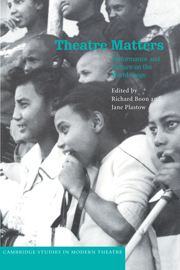Book contents
- Frontmatter
- Contents
- Notes on contributors
- Foreword: A letter from Kingston
- Preface
- Acknowledgements
- 1 Introduction
- 2 ‘The Revolution as Muse’: drama as surreptitious insurrection in a post-colonial, military state
- 3 Making theatre for a change: two plays of the Eritrean liberation struggle
- 4 Race matters in South African theatre
- 5 Dreams of violence: moving beyond colonialism in Canadian and Caribbean drama
- 6 The French-speaking Caribbean: journeying from the native land
- 7 ‘Binglishing’ the stage: a generation of Asian theatre in England
- 8 Popular theatre for the building of social awareness: the Indian experience
- 9 The promise of performance: True Love/Real Love
- 10 Making America or making revolution: the theatre of Ricardo Halac in Argentina
- Index
5 - Dreams of violence: moving beyond colonialism in Canadian and Caribbean drama
Published online by Cambridge University Press: 25 October 2009
- Frontmatter
- Contents
- Notes on contributors
- Foreword: A letter from Kingston
- Preface
- Acknowledgements
- 1 Introduction
- 2 ‘The Revolution as Muse’: drama as surreptitious insurrection in a post-colonial, military state
- 3 Making theatre for a change: two plays of the Eritrean liberation struggle
- 4 Race matters in South African theatre
- 5 Dreams of violence: moving beyond colonialism in Canadian and Caribbean drama
- 6 The French-speaking Caribbean: journeying from the native land
- 7 ‘Binglishing’ the stage: a generation of Asian theatre in England
- 8 Popular theatre for the building of social awareness: the Indian experience
- 9 The promise of performance: True Love/Real Love
- 10 Making America or making revolution: the theatre of Ricardo Halac in Argentina
- Index
Summary
Canada and the West Indies are very different societies: geographically, economically, racially and culturally. Yet in two important aspects they share comparable problems. Each has a colonial history, as well as a highly diverse and ethnically mixed population; and in each almost all the present population comes from elsewhere. Over the last three decades both have been preoccupied with creating a distinctive ‘national’ culture, rejecting previous dependency on the literary tradition of the imperial power, but without any obvious alternative to draw on – and in formulating this new identity, the stage has played a significant role.
Even here, the contrasts would seem far more crucial than the parallels. To state merely the obvious, the Caribbean is primarily a ‘black’ area, largely rural and still impoverished, only very recently independent, and with practically no pre-established indigenous theatrical infrastructure (experienced actors, professional directors or designers, even stages). In a sense this might be seen as a conceptual advantage, since starting from an artistic ground-zero encouraged experimentation with other native forms of presentation, particularly dance and carnival, from which a distinctive style of physical acting emerged. At the same time, the severe practical limitations meant that only a writer as dedicated as Derek Walcott could develop the conditions for the performance of his plays or an audience for them. And indeed, at least until the 1980s, Walcott was the sole Caribbean dramatist of any stature, while his Trinidad Theatre Workshop (TTW) remained the only company with extensive expertise.
- Type
- Chapter
- Information
- Theatre MattersPerformance and Culture on the World Stage, pp. 76 - 96Publisher: Cambridge University PressPrint publication year: 1998

